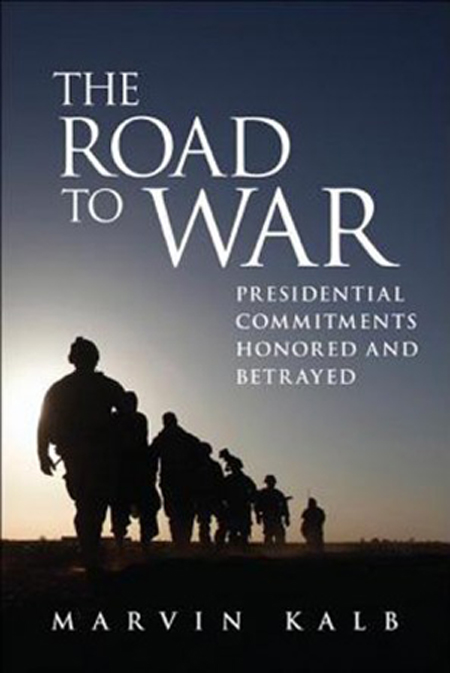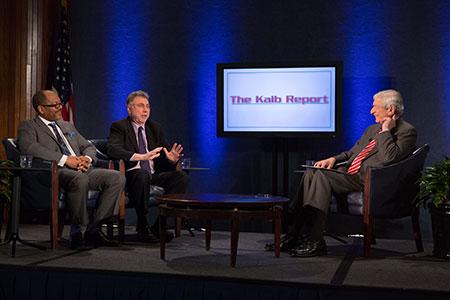
William J. Dobson is the politics and foreign affairs editor at Slate and the author of "The Dictator's Learning Curve: Inside the Global Battle for Democracy." Journalist and historian Marvin Kalb is senior adviser at the Pulitzer Center
Barack Obama has become America's foremost realpolitik president since Richard Nixon departed the White House in a helicopter. At every turn, Obama has conducted his foreign policy in a calculated fashion, shrewdly lining up the costs of a potential action against the likely benefits.
He hasn't been timid about the use of force — consider the sizable expansion of drone strikes on his watch — but when it comes to putting American power to use, he has been disciplined about defining the mission narrowly to advance U.S. interests. If that means "leading from behind," so be it. But foreign policy guided by high ideals or humanitarian impulses? No chance. Ask all those people who wanted to "save Darfur" how that turned out.
That is, until Syria. With this spiraling conflict, the deliberative president broke form and, in a moment he'd surely like to take back, told the world that if President Bashar al-Assad ever attempted to use chemical weapons, that would cross his "red line." (Obama invoked his "red line" or used similar unequivocal language at least five times in the past year.) As if bent to do precisely what Obama had forbidden, Assad proceeded to cross that line — repeatedly, and in the most horrific and brazen fashion on Aug. 21, when he gassed more than 1,400 men, women and children. But from the moment Obama uttered the words, he made a commitment and became the most recent in a long line of presidents who have had to wrestle with the importance of keeping foreign policy promises or betraying them.
In his timely book, "The Road to War," veteran journalist and diplomatic correspondent Marvin Kalb explores the tangled history of the foreign policy commitments that modern presidents have made and the knots these leaders have turned themselves into trying to rationalize or escape their words. The fact that these commitments, whether uttered privately or publicly, are often no more than words, rather than congressionally approved resolutions or declarations, is one of their defining features. Indeed, on only five occasions have American presidents requested declarations of war from Congress, the last being Franklin Roosevelt's action during World War II.
In his national address Tuesday night, Obama said that "for nearly seven decades, the United States has been the anchor of global security. This has meant doing more than forging international agreements — it has meant enforcing them." That's true — and presidents have generally preferred to make this work a solo project.
The lengths that a president will go to keep his military interventions at a safe remove from Capitol Hill are well known but no less absurd. Harry Truman played down his dispatch of U.S. troops to the Korean Peninsula as a "police action . . . to suppress a bandit raid." Three years later, Kalb notes, more than 54,000 American soldiers had died. Although he wrestled with his constitutional obligations more than most presidents did, Dwight Eisenhower was the first president to lie to Congress about U.S. involvement in Vietnam when he committed the first small detachment of B-26 bombers and Air Force personnel to assist French forces there.
Sen. John F. Kennedy questioned the logic of the U.S. commitment to defend Saigon from the North Vietnamese, but somehow those doubts melted once he was in the Oval Office; he never asked Congress to authorize his policy in Vietnam. Lyndon Johnson wanted a resolution to scale up in Vietnam — and of course the master of the Senate knew he had the votes — but he inadvertently created his own dangerous precedent: Loose, hasty, open-ended resolutions that support American presidents in committing troops abroad — and are preferably crafted in the White House — have become the standard.
And Richard Nixon, with a strong assist from Henry Kissinger, revealed the gross dangers of a president deploying force with a free hand. (Kalb dissects Nixon — who once placed him on his "enemies list" — with particular precision.)
Obama isn't uncomfortable using force. He ordered the raid that killed Osama bin Laden, oversees the kill lists that guide U.S. drone strikes and gave the green light to the campaign that ousted Libya's Moammar Gaddafi — without consulting Congress. In fact, the past three weeks haven't revealed a president disturbed by using force as much as a president who is bad at asking for permission.
The trouble for Obama is that the American public never drew its red lines in the same place he did. The president didn't speak for Americans — only 24 percent believe attacking Syria is in the national interest, according to an NBC News-Wall Street Journal poll— when he said Assad's use of chemical weapons would be a "game-changer." Obama, whose realist foreign policy positions had been so perfectly in step with the American mood, fell out of line. Burned by the false promises of George W. Bush's administration in Iraq and the grinding turmoil of the region, Americans are looking for an explanation based on cold, hard interests. After Sept. 11, 2001, we were all New Yorkers; now we are all realists.
The president's national address on Syria didn't budge Americans from that view. According to a CNN poll after his speech, 58 percent of Americans still thought U.S. military strikes would not achieve significant goals for the United States. Although the president gave an eloquent and at times moving case for action, it lacked the essential ingredient the public wanted to hear: why the cost of inaction would be greater than the risk of action. Americans agreed when the president said the United States shouldn't be the world's policeman — oddly, in a speech in which he argued that the United States should be policing Assad's crimes. If the French would like to conduct punitive strikes, so be it. Apparently, Americans think that everyone will have to settle for the French being the world's gendarme.
Presidential historians will long ponder what the White House was thinking when Obama unexpectedly pivoted and sought Congress's blessing for the use of force in Syria. Was it a cynical ploy to escape his pledge to act? Was it hubris and an exaggerated sense of his ability to persuade? Just another gut call, much like his original invocation of the red line? Kalb's book doesn't cite any previous instance when a president has risked his foreign policy credibility by submitting himself to Congress under such doubtful circumstances — because it's never happened.
Having decided to seek Congress's authorization to strike Syria, the Obama administration should have realized that it would require a far more compelling call to action than what it has mustered to date. None of its arguments — the defense of an international norm, the barbaric nature of Assad's crimes, the fact that other loathsome regimes may be emboldened — have dented Americans' skepticism. Indeed, the president conceded that the threat is not imminent. Some vague words about American exceptionalism are not nearly enough to steel the public. Indeed, the administration's arguments even misunderstand the roots of America's fighting spirit. Americans will take enormous risks for a just cause, freedom and the security of their country. But no one wants to be the first to die for a norm.
During the Cold War, it was easier for a president to argue that a particular foreign danger represented an "imminent threat." The ideological, zero-sum nature of the superpower contest let a president rationalize military interventions on the far corners of the map. If one communist insurgency could lead to the next, then the front lines of the global struggle were anywhere the president said they might be. "Domino visions were everywhere," Kalb writes. The bar is fortunately higher now, and for the American public the administration has yet to clear it in Syria.
Russian President Vladimir Putin's late-breaking proposal for Assad to hand over his chemical munitions is almost surely a convenient fiction; it is hard to fathom that Syria's brutal dictator will lead U.N. inspectors to his chemical storehouses and part with his most horrific weapon for ensuring his survival. Ronald Reagan's old dictum for Soviet disarmament — "trust but verify" — fails on both counts: We can neither trust nor probably verify Assad's actions.
But Putin's gambit lets everyone go back to square one. Moscow gets to postpone the danger of having cruise missiles rain down on Damascus, while crowing about its success. The Obama administration avoids the immediate embarrassment of having Congress hand it a defeat and now has an opportunity to exhaust its diplomatic options. Congress, too, is happy to have this foreign policy quandary return to the other end of Pennsylvania Avenue. Less-parochial Republicans didn't want to do grievous harm to U.S. credibility by refusing the president's request, while loyal Democrats didn't want to undercut their president and party leader.
But the most important question may be how Obama uses the time Putin and Assad have bought him. Will he take this reprieve and return to his realpolitik moorings? Or will he redouble his efforts and make a more persuasive case to move American public opinion? Hopefully, it won't require Assad to gas his people again for the president to find his voice.




